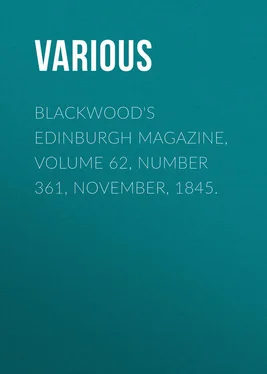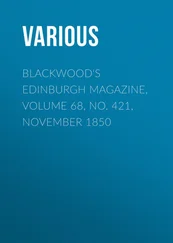Various - Blackwood's Edinburgh Magazine, Volume 62, Number 361, November, 1845.
Здесь есть возможность читать онлайн «Various - Blackwood's Edinburgh Magazine, Volume 62, Number 361, November, 1845.» — ознакомительный отрывок электронной книги совершенно бесплатно, а после прочтения отрывка купить полную версию. В некоторых случаях можно слушать аудио, скачать через торрент в формате fb2 и присутствует краткое содержание. Издательство: Иностранный паблик, Жанр: periodic, foreign_edu, Путешествия и география, на английском языке. Описание произведения, (предисловие) а так же отзывы посетителей доступны на портале библиотеки ЛибКат.
- Название:Blackwood's Edinburgh Magazine, Volume 62, Number 361, November, 1845.
- Автор:
- Издательство:Иностранный паблик
- Жанр:
- Год:неизвестен
- ISBN:нет данных
- Рейтинг книги:3 / 5. Голосов: 1
-
Избранное:Добавить в избранное
- Отзывы:
-
Ваша оценка:
- 60
- 1
- 2
- 3
- 4
- 5
Blackwood's Edinburgh Magazine, Volume 62, Number 361, November, 1845.: краткое содержание, описание и аннотация
Предлагаем к чтению аннотацию, описание, краткое содержание или предисловие (зависит от того, что написал сам автор книги «Blackwood's Edinburgh Magazine, Volume 62, Number 361, November, 1845.»). Если вы не нашли необходимую информацию о книге — напишите в комментариях, мы постараемся отыскать её.
Blackwood's Edinburgh Magazine, Volume 62, Number 361, November, 1845. — читать онлайн ознакомительный отрывок
Ниже представлен текст книги, разбитый по страницам. Система сохранения места последней прочитанной страницы, позволяет с удобством читать онлайн бесплатно книгу «Blackwood's Edinburgh Magazine, Volume 62, Number 361, November, 1845.», без необходимости каждый раз заново искать на чём Вы остановились. Поставьте закладку, и сможете в любой момент перейти на страницу, на которой закончили чтение.
Интервал:
Закладка:
An acquaintance with the history of the country and the leading characters in its annals, is indispensable to enable the traveller to appreciate the historical associations connected with the scenes; a certain degree of familiarity with its principal authors, to render him alive to that noblest of interests – that arising from the recollection of Genius and intellectual Achievement. Without an acquaintance with political economy and the science of government, he will be unable to give any useful account of the social state of the country, or furnish the most valuable of all information – that relating to the institutions, the welfare, and the happiness of man. Statistics form almost an indispensable part of every book of travels which professes to communicate information; but mere statistics are little better than unmeaning figures, if the generalizing and philosophical mind is wanting, which, from previous acquaintance with the subjects on which they bear, and the conclusions which it is of importance to deduce from them, knows what is to be selected and what laid aside from the mass. Science, to the highest class of travellers, is an addition of the utmost moment; as it alone can render their observations of use to that most exalted of all objects, an extension of the boundaries of knowledge, and an enlarged acquaintance with the laws of nature. The soul of a poet is indispensable to form the most interesting species of travels – a mind, and still more a heart, capable of appreciating the grand and the beautiful in Art and in Nature. The eye of a painter and the hand of a draughtsman are equally important to enable him to observe with accuracy the really interesting features of external things, and convey, by faithful and graphic description, a correct impression of what he has seen, to the mind of the reader. Such are the qualifications necessary for a really great traveller. It may be too much to hope to find these ever united in one individual; but the combination of the majority of them is indispensable to distinction or lasting fame in this branch of literature.
Compare these necessary and indispensable qualifications for a great traveller, with those which really belong to our young men who are sent forth from our universities or academies into the world, and take upon themselves to communicate what they have seen to others. Does the youth come from Oxford? His head is full of Homer and Virgil, Horace and Æschylus: he could tell you all the amours of Mars and Venus, of Jupiter and Leda; he could rival, Orpheus or Pindar in the melody of his Greek verses, and Cicero or Livy in the correctness of his Latin prose; but as, unfortunately, he has to write neither about gods nor goddesses, but mere mortals, and neither in Greek verse nor Latin verse, but good English prose, he is utterly at a loss alike for thought and expression. He neither knows what to communicate, nor is he master of the language in which it is to be conveyed. Hence his recorded travels dwindle away into a mere scrap-book of classical quotations – a transcript of immaterial Latin inscriptions, destitute of either energy, information, or eloquence. Does he come from Cambridge? He could solve cubic equations as well as Cardan, is a more perfect master of logarithms than Napier, could explain the laws of physical astronomy better than Newton, and rival La Grange in the management of the differential calculus. But as, unluckily, the world which he visits, and in which we live, is neither a geometric world nor an algebraic world, a world of conic sections or fluxions; but a world of plains and mountains, of lakes and rivers, of men and women, flesh and blood – he finds his knowledge of little or no avail. He takes scarce any interest in the sublunary or contemptible objects which engross the herd of ordinary mortals, associates only with the learned and the recluse in a few universities, and of course comes back without having a word to utter, or a sentence to write, which can interest the bulk of readers. Does he come from the London University, or any of the provincial academies? He is thinking only of railroads or mechanics, of chemistry or canals, of medicine or surgery. He could descant without end on sulphuric acid or decrepitating salts, on capacity for caloric or galvanic batteries, on steam-engines and hydraulic machines, on the discoveries of Davy or the conclusions of Berzelius, of the systems of Hutton or Werner, of Liebig or Cuvier. But although an acquaintance with these different branches of practical knowledge is an indispensable preliminary to a traveller in foreign countries making himself acquainted with the improvements they have respectively made in the useful or practical arts, they will never qualify for the composition of a great or lasting book of travels. They would make an admirable course of instruction for the overseer of a manufactory, of a canal or railway company, of an hospital or an infirmary, who was to visit foreign countries in order to pick up the latest improvements in practical mechanics, chemistry, or medicine; but have we really become a race of shopkeepers or doctors, and is Science sunk to be the mere handmaid of Art?
We despair therefore, as long as the present system of education prevails in England, (and Scotland of course follows in the wake of its great neighbour,) of seeing any traveller arise of lasting celebrity, or book of travels written which shall attain to durable fame. The native vigour and courage, indeed, of the Anglo-Saxon race, is perpetually impelling numbers of energetic young men into the most distant parts of the earth, and immense is the addition which they are annually making to the sum-total of geographical knowledge. We have only to look at one of our recent maps, as compared to those which were published fifty years ago, to see how much we owe to the courage and enterprise of Parry and Franklin, Park and Horneman, of Burckhardt and Lander. But giving all due credit – and none give it more sincerely than we do – to the vigour and courage of these very eminent men, it is impossible not to feel that, however well fitted they were to explore unknown and desert regions, and carry the torch of civilization into the wilderness of nature, they had not the mental training, or varied information, or powers of composition, necessary to form a great writer of travels . Clarke and Bishop Heber are most favourable specimens of English travellers, and do honour to the great universities of which they were such distinguished ornaments; but they did not possess the varied accomplishments and information of the continental travellers. Their education, and very eminence in their peculiar and exclusive lines, precluded it. What is wanting in that character above every thing, is an acquaintance with, and interest in, a great many and different branches of knowledge , joined to considerable power of composition, and unconquerable energy of mind; and that is precisely what our present system of education in England renders it almost impossible for any one to acquire. The system pursued in the Scottish universities, undoubtedly, is more likely to form men capable of rising to eminence in this department; and the names of Park and Bruce show what travellers they are capable of sending forth. But the attractions of rank, connexion, and fashion, joined to the advantage of speaking correct English, are fast drawing a greater proportion of the youth of the higher ranks in Scotland to the English universities; and the education pursued at home, therefore, is daily running more and more into merely utilitarian and professional channels. That system is by no means the one calculated to form an accomplished and interesting writer of travels.
In this deficiency of materials for the formation of a great body of male travellers, the ladies have kindly stepped in to supply the deficiency; and numerous works have issued from the press, from the pens of the most accomplished and distinguished of our aristocratic beauties. But alas! there is no royal road to literature, any more than geometry. Almack's and the exclusives, the opera and ducal houses, the lordlings and the guards, form an admirable school for manners, and are an indispensable preliminary to success at courts and coronations, in ball-rooms and palaces. But the world is not made up of courts or palaces, of kings or princes, of dukes or marquesses. Men have something more to think of than the reception which the great world of one country gives to the great world of another – of the balls to which they are invited, or the fêtes which they grace by their charms – or the privations to which elegant females, nursed in the lap of luxury, are exposed in roughing it amidst the snows of the North or the deserts of the South. We are grateful to the lady travellers for the brilliant and interesting pictures they have given us of capitals and manners, 3 3 Lady Londonderry's description of Moscow is the best in the English language.
of costume and dress, and of many eminent men and women, whom their rank and sex gave them peculiar opportunities of portraying. But we can scarcely congratulate the country upon having found in them a substitute for learned and accomplished travellers of the other sex; or formed a set-off on the part of Great Britain, to the Humboldts, the Chateaubriands, and Lamartines of continental Europe.
Интервал:
Закладка:
Похожие книги на «Blackwood's Edinburgh Magazine, Volume 62, Number 361, November, 1845.»
Представляем Вашему вниманию похожие книги на «Blackwood's Edinburgh Magazine, Volume 62, Number 361, November, 1845.» списком для выбора. Мы отобрали схожую по названию и смыслу литературу в надежде предоставить читателям больше вариантов отыскать новые, интересные, ещё непрочитанные произведения.
Обсуждение, отзывы о книге «Blackwood's Edinburgh Magazine, Volume 62, Number 361, November, 1845.» и просто собственные мнения читателей. Оставьте ваши комментарии, напишите, что Вы думаете о произведении, его смысле или главных героях. Укажите что конкретно понравилось, а что нет, и почему Вы так считаете.












